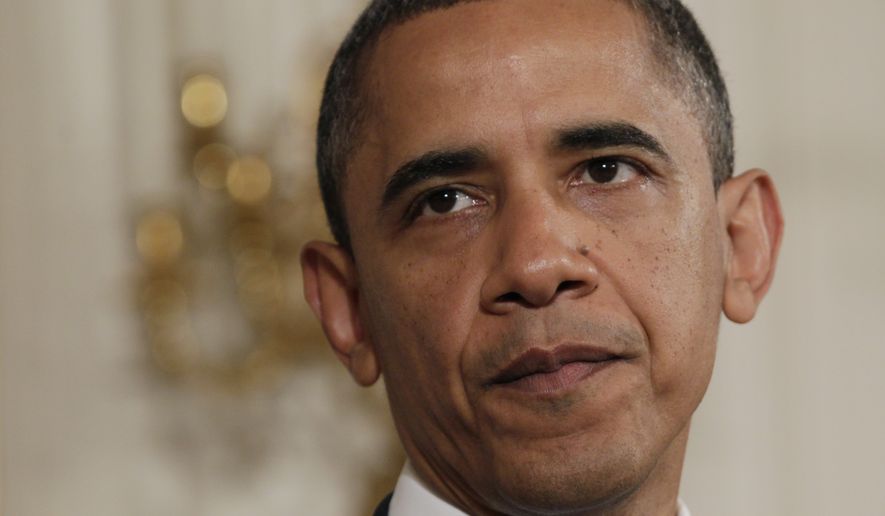Pummeled by ghastly economic news, President Obama called Monday for more spending and extended tax cuts that he said would help stimulate the economy — but these also could deepen the deficit problems that helped the federal government earn its first-ever debt downgrade last week.
The president made the proposals as world stock market indexes were tumbling, and his remarks seemed designed to help the White House regain its political footing by resetting the congressional agenda next month. Mr. Obama said he wants the 2 percent payroll-tax cut extended into next year, the creation of an infrastructure bank by Congress to promote construction, and enhanced unemployment benefits extended for another year.
“If Congress fails to extend the payroll-tax cut and the unemployment-insurance benefits that I’ve called for, it could mean 1 million fewer jobs and half a percent less growth,” the president said from the White House, as stocks were in the midst of deep losses that would register a nearly 635-point drop in the Dow Jones industrial average. “This is something we can do immediately, something we can do as soon as Congress gets back.”
Those items together, however, come with a price tag that exceeds $100 billion in 2012 alone, and which, unless they were coupled with offsetting cuts or tax increases elsewhere, would dwarf the $7 billion in 2012 savings that it took Congress four months to wrangle in last week’s debt deal.
The White House has not offered offsets and didn’t respond immediately to messages seeking comment on whether he wants his proposals to be deficit-neutral.
Congressional Republicans already are taking a dim view toward adding more stimulus spending to the deficit.
“Every penny of new spending — ’investments’ — will be paid for with borrowed money,” said Sen. Jeff Sessions of Alabama, the ranking Republican on the Senate Budget Committee. “We must now begin a sustained program of reducing debt, not creating more. The president’s determination to spend and borrow even more, despite the credit downgrade, shows that he is in denial. He remains unwilling to acknowledge the true danger posed by our debt.”
With the debt debate still raging after a bipartisan deal was reached last week, Mr. Obama promised he would put forth his plan for how the administration and Congress should proceed as they try to grapple with record debt, staggering annual deficits and an aging population that will make growing demands on the federal budget.
Mr. Obama said that last week’s debt deal, which envisions limits on discretionary spending, probably has tapped out the domestic side of the budget. Any future action, he said, will have to come either from Medicare cuts or tax increases.
The administration has argued that Friday’s downgrade by Standard & Poor’s, which lowered the U.S. government’s credit rating from AAA to AA+ status, is a result of Republican irresponsibility. The GOP insisted that raising the government’s borrowing limit be coupled with new controls on spending.
“We knew from the outset that a prolonged debate over the debt ceiling — a debate where the threat of default was used as a bargaining chip — could do enormous damage to our economy and the world’s,” Mr. Obama said. “That threat, coming after a string of economic disruptions in Europe, Japan and the Middle East, has now roiled the markets and dampened consumer confidence and slowed the pace of recovery.”
Mr. Obama said Monday that there should be “a renewed sense of urgency,” but the White House deflected questions about using Mr. Obama’s power under the Constitution to call Congress back into session during its August recess.
Republicans and Democrats alike questioned S&P’s decision. Some said the ratings agency had been complicit in decades of ballooning debt only to balk at a time when both parties had struck a deal.
That deal includes about $1 trillion in lower projected spending over the next 10 years by limiting discretionary spending and establishes a 12-member supercommittee tasked with recommending an additional $1.5 trillion in higher taxes, lower spending or a combination of the two.
Top Republicans, though, said Mr. Obama isn’t willing to accept the kinds of changes needed for Social Security and Medicare, and said no deal on taxes can be reached without those. They prepared their members for a bruising political fight.
“Over the next several months, there will be tremendous pressure on Congress to prove that S&P’s analysis of the inability of the political parties to bridge our differences is wrong,” House Majority Leader Eric Cantor, Virginia Republican, wrote in a public memo to his colleagues. “In short, there will be pressure to compromise on tax increases. We will be told that there is no other way forward. I respectfully disagree.”
Last week’s debt deal calls for lower projected discretionary spending of $917 billion over the next decade, but in terms of actual dollar-to-dollar cuts, it lowers spending just $7 billion in 2012, and only an additional $3 billion in 2013.
Many conservative Republicans voted against the deal, arguing those cuts didn’t go deep enough. Liberal Democrats, meanwhile, said it bled domestic priorities too much.
But that $7 billion in savings pales in comparison with the deficit hole that would be opened if Congress adopts all of Mr. Obama’s new proposals.
Extending unemployment benefits in 2012 would cost $45 billion, and the infrastructure bank would cost an additional $5 billion next year, according to the president’s budget. Extending the payroll-tax cut for another year would lower tax receipts by more than $100 billion.
• Stephen Dinan can be reached at sdinan@washingtontimes.com.




Please read our comment policy before commenting.